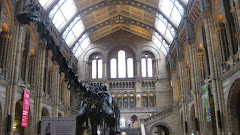Thursday, 2 July 2009
Huxley's "On the Advisableness of Improving Natural Knowledge"
In his essay, “On the Advisableness of Improving Natural Knowledge,” Huxley claims a new revolutionary role for science, over spiritual as well as physical domains: “natural knowledge, in desiring to ascertain the laws of comfort, has been driven to discover those of conduct, and to lay the foundations of a new morality” (7). This is as brave new world, where the universe and our place in it will be understood rationally, finally fulfilling our spiritual needs and thus ending any need for religion. Yet Huxley’s essay suggests doubts about science’s ability to take up this awful responsibility, which was formerly assumed by divine will. Huxley writes that men “were themselves the author of both plague and fire [of the 1660’s], and that they must look to themselves to prevent the recurrence of future calamities” (2). Science, then, should not only be praised for overcoming natural calamities, but also blamed for everything it doesn’t do—the diseases it hasn’t eliminated, the natural disasters it hasn’t safeguarded against. Also, before expounding on the earth-shaking advances in astronomy, physics, and biology, Huxley admits the inability of science to replace religion in explaining our universe in former eras, as “the little light of awakened human intelligence…seems so insufficient to do more than illuminate the imperfections that cannot be remedied, the aspirations that cannot be realized, of man's own nature” (8). Huxley talks of the injurious effects of blind belief, yet he did trust in the ability of “natural knowledge” to make the world right, when in fact it was and is far from it.
Subscribe to:
Post Comments (Atom)

No comments:
Post a Comment